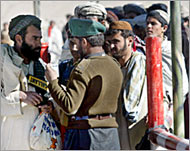Pakistani tribes resent army presence
Legislator Abd al-Sattar Wazir promised his voters in the South Waziristan border region to fight for their fundamental rights and infrastructure development of the remote and neglected area.

Little did he know, however, that the global hunt for al-Qaida suspects would dent his mission and turn his constituency into a besieged region.
South Waziristan is part of Pakistan’s border belt that straddles Afghanistan, and is ruled by a special set of laws the British colonial rulers had left behind before the creation of Pakistan out of greater India.
For decades, this area remained out of bounds for authorities and served as a safe haven for smugglers and fugitives from the law.
Predicament
As the authorities scour this remote region in search of Islamist fighters as part of the continuing “war against terrorism” since late 2001, they are now trying to bring it under their writ.
Not without problems though.
Abd al-Sattar’s predicament, and that of thousands of his villagers, began early in October when Pakistan army troops seized the administrative headquarters of South Waziristan (WANA) bordering Afghanistan and launched a bloody operation to flush out Afghan Taliban and al-Qaida suspects.
 |
|
Security is tight in the tribal region |
At least a dozen foreign fighters were killed and another 19 arrested in a shootout in the first week of October.
Suspecting the presence of more fighters, the army pulled in more troops and expanded the siege and search operations in order to achieve more arrests, and to punish those sheltering the “fugitives”.
“With every passing day, tension is mounting and people are getting angrier,” Wazir said of the continued activities of the Pakistan army.
It has since demolished at least three dozen houses, impounded dozens of vehicles and arrested a couple of hundred people they believed had been either supporting or sheltering Taliban or al-Qaida suspects.
However, the tribes – traditionally ultra-conservative, staunch Muslims – have so far denied the presence of suspected fighters and withstood the blockade by the military.
While the army launched several development projects in the border regions, a majority of tribes seemed averse to their presence, considering it an intrusion in their lives.
“The resentment is growing and people are increasingly becoming anti-army because of their heavy presence and high-handedness,” Wazir said.
Warning
Pakistan’s mainstream opposition parties including Alliance for Restoration of Democracy (ARD) and the six-party religio-political alliance – Muttahida Majlis-e-Ammal (MMA) are asking the army to pull out of the area immediately.
The MMA draws the bulk of its political support from the tribal as well as the adjoining regions in the country’s southwestern and northwestern provinces.
 |
|
Pakistani soldiers are entrenching |
“We will launch a movement to oust President Pervez Musharraf from power if the operation is not stopped in WANA,” said MMA vice-president Qazi Husayn Ahmad.
Being a close ally of the United States, President Musharraf, however, remains firm.
“The military operation will continue in tribal areas, and it’s because of this that extremists are on the run there,” he told editors of Pakistani newspapers, analysts and senior columnists in a recent meeting.
Though the operation is currently on hold, the army remains camped there and local tribes are looking for ways to pressurise it to pull out.
As a pre-emption, local authorities are preparing to convene a consultative assembly (Jirga) of tribal elders to discuss handing over of al-Qaida and Taliban suspects.
Regardless of the outcome of these meetings, the border regions are increasingly becoming restive both because of the opposition to the army’s presence, as well as a fear of intrusion.
Afghan authorities allege that opposition forces are using these areas for planning and launching attacks on allied forces inside Afghanistan.
Pakistani officials reject this and say the anti-al-Qaida operation has broken the back of “terrorists”.
Suspects
Since October 2001, Pakistan has deployed more than 50,000 troops along its 2450 km porous border to track down Taliban and al-Qaida fugitives.
It has also turned over more than 500 suspects to the US since December 2001.
|
“The only objective is to stop the cross-border movement – whether they are terrorists or smugglers” General Sadaqat Ali Shah, |
While the US administration has showered praise on Pakistan for its “anti-terror” efforts, thousands of tribesmen have heaped scorn on the army for alleged “human rights violations under US command”.
“There is not even a single human rights violation taking place in South Waziristan. The operation is specifically targeted against foreign terrorists, who have their hideouts in this area,” said Masud Khan, the spokesman in the ministry of foreign affairs.
“The only objective is to stop the cross-border movement – whether they are terrorists or smugglers,” General Sadaqat Ali Shah, the chief of the Frontier Corps in Balochistan said.
But he admitted that the tribes do view these operations largely “as interference in their life”.
Observers, however, believe that whether the roughly seven million tribesmen like it or not, they shall have to reconcile with the post-9/11 scenario.
“Nobody can reverse the wheel of social evolution and progress, nor can the tribesmen stay aloof from winds that are sweeping across the world,” said Anwar Durrani, a Peshawar-based observer of tribal regions.